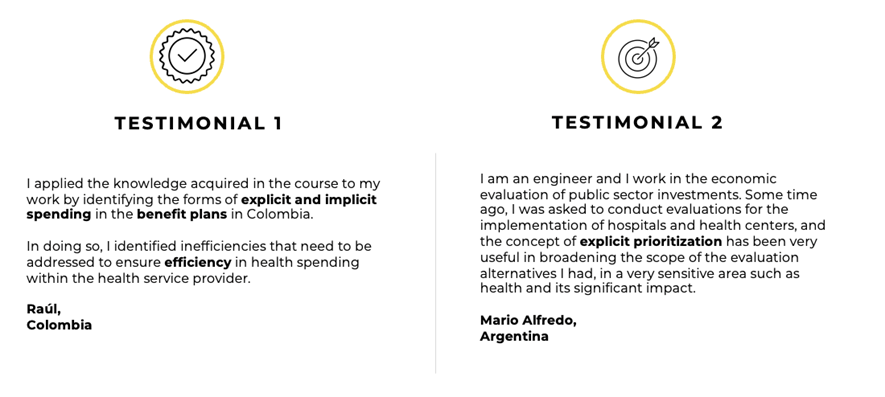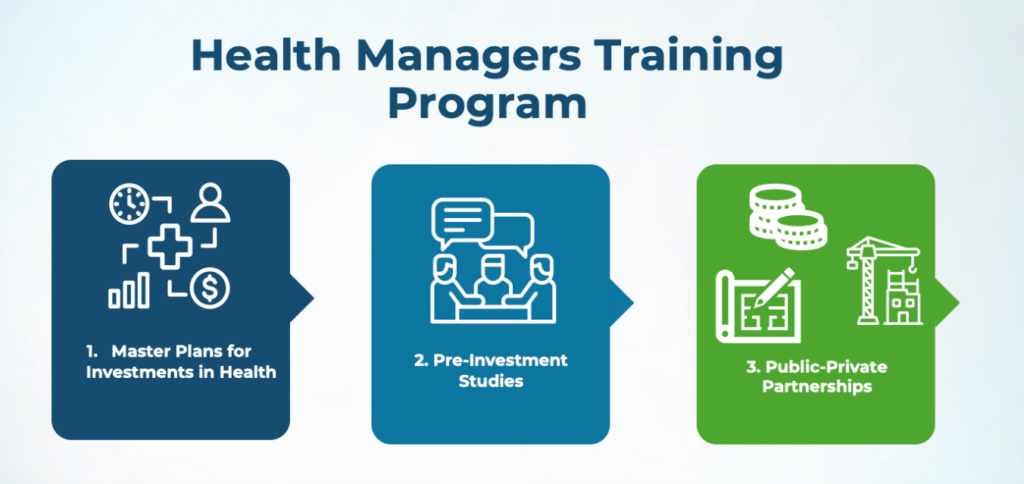Health systems in Latin America and the Caribbean face growing challenges in ensuring efficient, sustainable, and high-quality services for everyone. Population aging, the increasing burden of chronic diseases, and limited resources make improving the performance of the health sector an unavoidable priority.
On this path, continuous training and access to evidence-based tools are key for policymakers and health specialists to make better decisions and achieve the greatest possible impact. With this goal in mind, at the IDB, we offer online, open, certified courses free of charge that provide practical knowledge to address the sector’s challenges. Below, we present four of our main training opportunities in health.
Key Tools to Improve Health Spending
How can governments decide which health services and technologies to finance for the population and how to do it with the available public resources? And how can they ensure that these decisions are based on the best available evidence and generate the greatest possible benefit for people?
To respond to these challenges, the IDB, in collaboration with the Center for Global Development, developed the course What to Finance in Health and at What Price?—available in Spanish and English, with more than 5,300 participants so far. This course offers practical tools to advance toward universal health coverage and improve the efficiency of public spending in this sector: explicit prioritization in health and instruments to secure more affordable medicine prices.
Over the course of eight modules, participants explore fundamental concepts and international experiences that can guide countries in the region toward more informed decision-making, leading to better health for all. Click here to register!

Health Managers Training Program
How can health investments be planned to meet real population needs? How can sustainable and efficient hospitals be designed? How should investment projects financed by the private sector be prepared?
These are key questions for organizing the planning, preparation, and execution of investment projects that strengthen health systems. To address them, we developed a training program consisting of three online, self-paced courses free of charge, available in Spanish. Its goal is to strengthen the capacities of those making strategic decisions in the sector, especially public officials, technical teams, and professionals involved in investment, planning, and financing.

1. Master Plans for Investments in Health
In a context of budget constraints like the one the region faces, it is urgent for public investment to be effective and maximize available resources. Master Plans for Investment in Health (HIMPs) are a key tool to improve the impact and sustainability of health systems.
HIMPs are short-, medium-, and long-term roadmaps designed to optimize the use of resources and improve the effectiveness of investments in building sustainable health responses. This course explains how to design master plans based on demand analysis, service projections, and the strategic use of ICT. An opportunity to approach investments with a systemic and territorial perspective. Click here to register.
2. Hospital Pre-Investment Studies
Across the region, many hospitals, health centers, and clinics remain empty or underutilized—the so-called “white elephants.” At the same time, the opposite occurs: overburdened services without sufficient space to care for patients, with heavy overcrowding of staff, patients, and equipment. Both extremes stem from the same cause: shortcomings in investment planning, particularly in pre-investment studies for health projects.
Learning how to structure a pre-investment study is essential to ensure that resources allocated to hospital infrastructure are efficient, sustainable, and respond to real needs. This course covers the entire process, from diagnosis to alternative analysis and solution proposals, providing key tools for evaluating and planning new hospitals. Register here!
3. Public-Private Partnerships in the Health Sector
Public-private partnerships (PPPs) can be a powerful tool to expand coverage, improve quality, and achieve greater efficiency in health services. But for them to truly work, they must be well-designed from the start: responding to real needs, including clear evaluation criteria, and based on strong legal and financial frameworks. It is not just about attracting private investment but about structuring sustainable projects that generate public value, with appropriate mechanisms for oversight, participation, and accountability.
This course provides practical tools to design, implement, and evaluate health PPPs, drawing on concrete experiences in the region and principles recognized by international organizations. Click here to register.
Building Capacity to Transform Health
Training not only enriches the professional careers of those working in health, it also strengthens the ability of systems to adapt, innovate, and respond to population needs.
Continuous, open, evidence-based training, like that offered by the IDB, is a powerful tool to design better public policies, make informed decisions, and build more resilient, efficient, and equitable health systems.
Take advantage of these resources free of charge and join the challenge of transforming health in Latin America and the Caribbean. Register now!


Leave a Reply